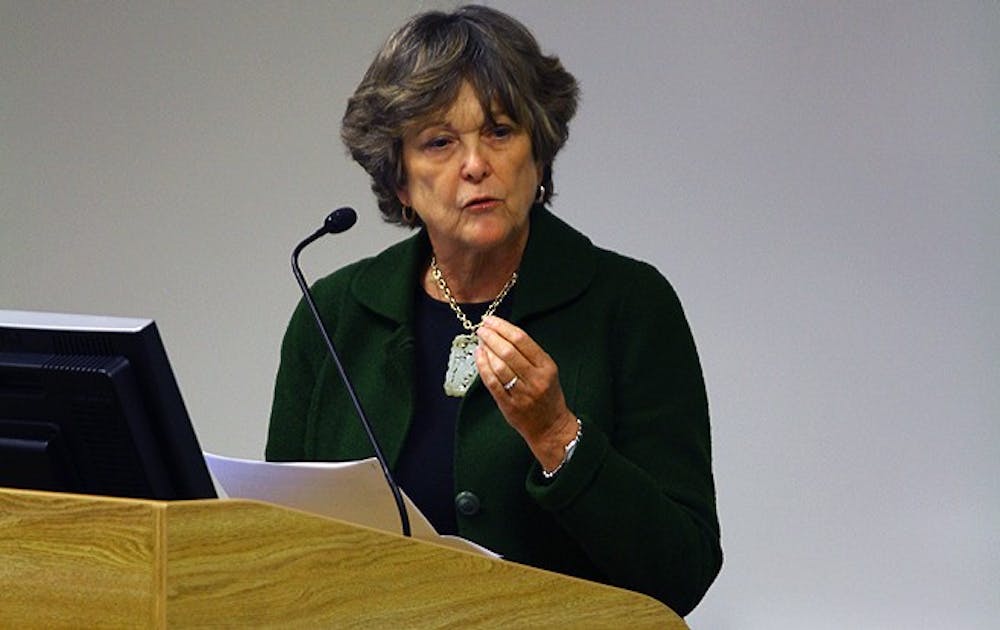Duke Kunshan University seeks to form a unique culture and collegiate identity as it strives to preserve the academic excellence for which Duke is known, Executive Vice Chancellor Mary Bullock said.
At Thursday’s Academic Council meeting, Bullock presented her vision for cultural synthesis between China and the United States. She also further detailed Duke’s plans to preserve academic freedom on the campus, slated to open to students in the 2013-2014 academic year. The Chinese people and the city of Kunshan are working to make the campus environment supportive for an international student population, she added.
“They want a world-class university. They want to experiment. They are taking political risks that we cannot even imagine,” Bullock said. “We need their support if we want DKU to grow deep roots in China’s culture.”
Although Bullock said students of DKU will have “complete freedom of academic inquiry”—meaning people will be able to pursue any topic of their choosing in an academic setting—she is careful not to “soft pedal” legitimate concerns about students fearing restrictions of speech and media access. Despite her confidence that there will be academic freedom at DKU, Bullock added that there are backup plans in place in case the Chinese government restricts access to certain websites or media outlets—the campus will be able to connect remotely to Duke’s internet using a virtual private network.
“We should make sure DKU is known for its emphasis on academic integrity, academic responsibility and academic innovation,” Bullock said. “We anticipate that students on [the DKU] campus will have access to the same technology and internet as students [in Durham].”
The campus will feature faculty leadership familiar to Duke but new to China. Bullock said faculty governance there will mimic Duke’s structure—even though a similar system failed when DKU Chancellor Liu Jingnan tried to implement it as president of Wuhan University—Duke’s Chinese legal partner. But DKU will develop its own identity—separate from that of Duke and Wuhan—by hiring a permanent staff of professors from Duke and other top Chinese and international universities, she said.
A group of Duke professors plan to tour China’s top undergraduate universities early next year to form a plan to adapt prominent Chinese teaching styles into a new model for teaching at DKU. Bullock said she hopes the new styles that result from the collaboration will serve as a new and more effective approach for teaching liberal arts throughout the world. She added that a strong liberal arts curriculum and interdisciplinary courses that focus on China’s history and cultural differences could bridge the gap between east and west.
Bullock added that she hopes to introduce courses in American history and social sciences at DKU, which are currently not offered in China.
The campus will feature water canals that mimic the city’s natural landscape. Kunshan, which is funding the campus’ construction, is also constructing an area directly across from the campus that will feature start-up science and technology companies, apartments, restaurants and shopping for students to enjoy, Bullock said.
Such developments will provide students with a taste of China’s culture, noted Daniel Gauthier, Robert C. Richardson professor of physics, adding that it will be similar to the rich Durham culture surrounding Duke.
But some council members remain uncertain about the venture.
Mary Boatwright, professor of ancient history, expressed concern that the cultural and language barriers could prevent students from getting the most of their China experience.
“We are going to look carefully at orientation programs for all students in terms of how they communicate with one another,” Bullock said.
She added that classes at DKU will be taught in English, but students will be expected to improve their Chinese language skills and understanding of the Chinese culture.
In other business
Board of Trustees Chair Richard Wagoner, Trinity ’75, presented the Board’s changing role in light of the Duke Forward capital campaign and other challenges. Every member of the Board recognizes the importance the entire Duke community will play as the University continues to grow, he said.
“The Board of Trustees fully understands and embraces the importance of Duke faculty and staff members,” he said.
Wagoner shared an optimistic outlook for the University’s future despite new challenges.
“This is exactly the kind of environment in which Duke can shine and thrive,” Wagoner said.
Get The Chronicle straight to your inbox
Signup for our weekly newsletter. Cancel at any time.

